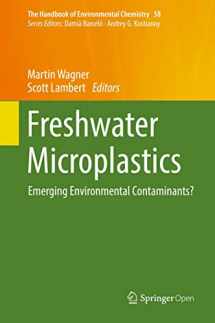
Freshwater Microplastics: Emerging Environmental Contaminants? (The Handbook of Environmental Chemistry, 58)
Book details
Summary
Description
This book is open access under a CC BY 4.0 license.
This volume focuses on microscopic plastic debris, also referred to as microplastics, which have been detected in aquatic environments around the globe and have accordingly raised serious concerns. The book explores whether microplastics represent emerging contaminants in freshwater systems, an area that remains underrepresented to date.
Given the complexity of the issue, the book covers the current state-of-research on microplastics in rivers and lakes, including analytical aspects, environmental concentrations and sources, modelling approaches, interactions with biota, and ecological implications. To provide a broader perspective, the book also discusses lessons learned from nanomaterials and the implications of plastic debris for regulation, politics, economy, and society. In a research field that is rapidly evolving, it offers a solid overview for environmental chemists, engineers, and toxicologists, as well as water managers and policy-makers.


We would LOVE it if you could help us and other readers by reviewing the book
Book review



